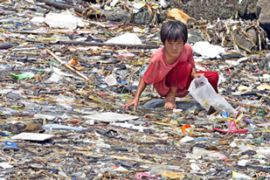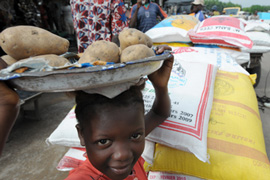Poorer nations face financing gap
Financing shortfall could reach $700bn in 2009 as trade income dwindles, World Bank says.

The World Bank said the crisis could have long-lasting repercussions for developing countries, which are contending with a drop in exports as world trade shrinks for the first time since 1982.
‘Fewer resources’
At the same time, remittances from overseas workers are slowing and falling commodity prices have sapped a revenue source that many countries rely on.
| In video |
|
|
“The challenge facing developing countries is how, with fewer resources, to pursue policies that can protect or expand critical expenditures, including on social safety nets, human development and critical infrastructure,” the World Bank said in its report.
It estimated that in 2009, 104 of 129 developing countries will have current account surpluses smaller than private debt. For these countries, total financing needs were expected to amount to more than $1.4 trillion during the year.
Financial demands on international donors are expected to exceed private sources of financing (equity flows and private debt disbursements) in 98 of the 104 countries, implying a financing gap in those 98 countries of about $268bn.
Should rollover rates, or loan renewals, come in lower than expected, or capital flight significantly increase, this figure could rise to almost $700bn, the World Bank said.
It said the situation could become as severe in poorer countries where falling growth will impact families living just above the poverty line, who are particularly vulnerable.
‘Behind the curve’
Aly Khan Satchu, a Nairobi-based financial analyst, told Al Jazeera that the World Bank report was a “wake-up call” to the developing world.
“I think the World Bank is actually just signalling how bad it is and signalling that it is the more fragile countries, the developing world, the emerging world that has to get together and make its case before the coffers are plundered,” he said.
 |
| Falling growth will impact families living just above the poverty line in poorer nations [AFP] |
“In the developing world we have been a little bit slow off the draw, a little bit behind the curve. The Americans, the British are all raising huge amounts of capital and there is a giant sucking sound you can here going in that direction.
“Wherever you turn you can see the level of unrest spiking up and one wonders whether our policymakers have the understanding to deal with the situation.”
Many of the worst affected countries are heavily reliant on aid which could be cut as rich nations cope with budget pressures of their own.
“There is therefore a strong need to expand assistance to [lower income countries] to protect critical expenditures and prevent an erosion of progress in reducing poverty,” the World Bank said.
Meanwhile, the likely sharp drop in remittances will affect the incomes of poor families as unemployment rises and more migrant workers lose jobs in Europe and the United States.
Remittance flows are estimated to have reached $305bn in 2008, up nine per cent from 2007.
World Bank projections suggest remittances to developing countries will fall in 2009, with Africa, Eastern Europe and Central Asia hardest hit.

